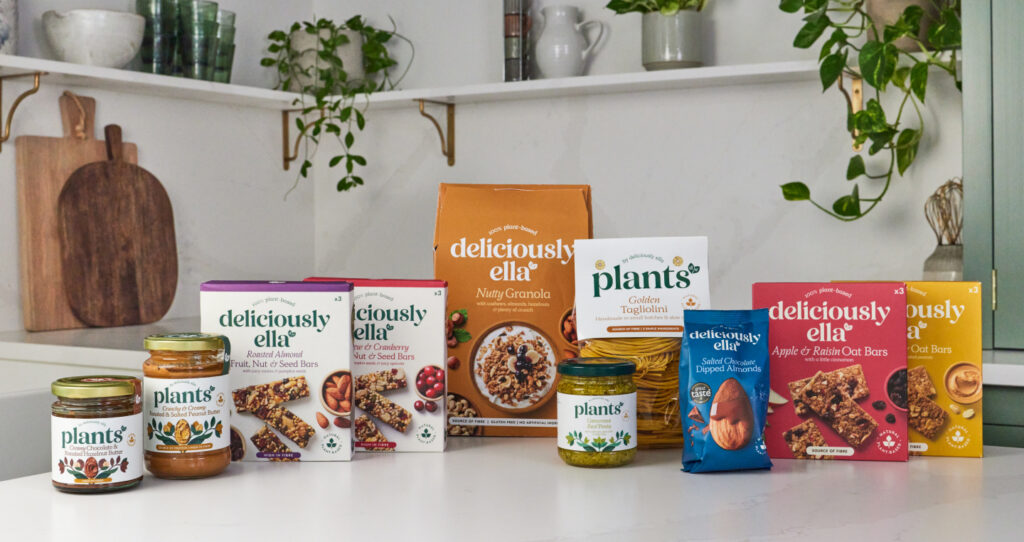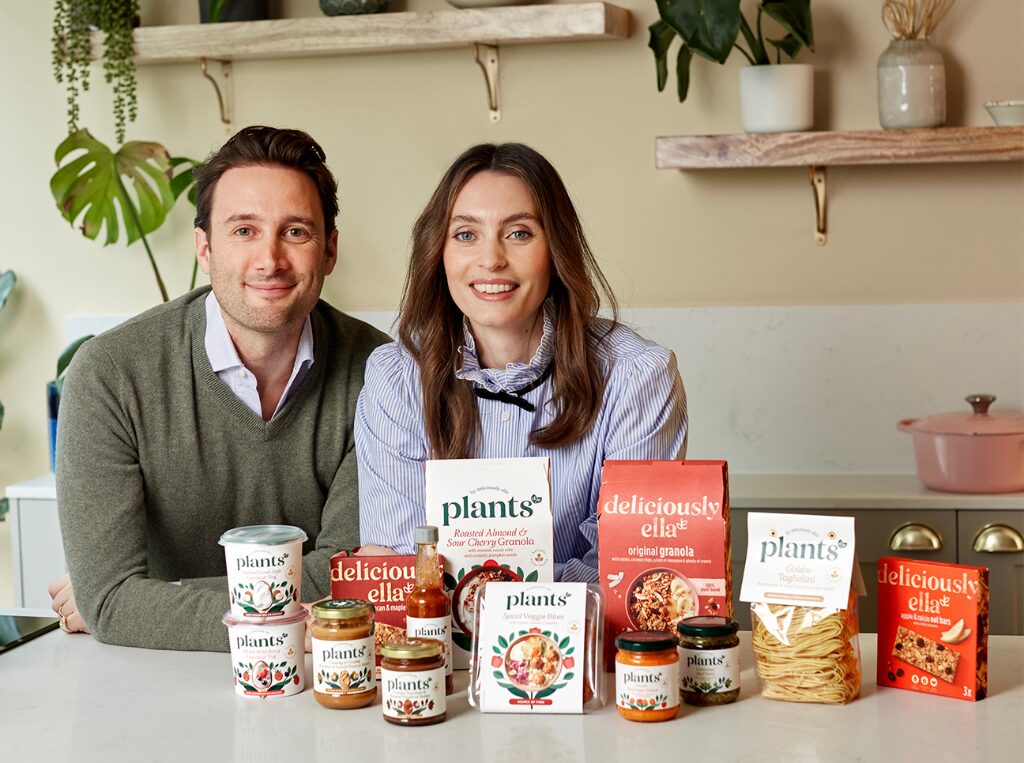Deliciously Ella: After Years of Trolling, Ella Mills is Finally Happy (and Thriving) Now
7 Mins Read
Ever the darling of the UK’s plant-based space – with a recipe book that sold faster than any other vegan cookbook ever – Ella Mills retreated from the limelight a few years ago. Her brand, Deliciously Ella, suffered setbacks from the pandemic too. But now, both founder and company are back in the headlines.
“It was easier to be quiet,” said Ella Mills. “[Being silent] doesn’t feel good either but I found all the attacks a massive, massive adjustment.”
The 32-year-old entrepreneur was speaking to the Times ahead of the release of her latest cookbook, Healthy Made Simple, and her plant-based brand Deliciously Ella’s entry into the US. Beginning as a food blogger (then known as Ella Woodward), she “cured” her autoimmune disease through a whole-food plant-based diet. An heiress of the Sainsbury family, she became a household name in the UK as one of her generation’s clean-eating pioneers (a moniker she never assumed herself).
Now an author of eight cookbooks (with over 1.5 million copies sold), her 2015 title Deliciously Ella became the fastest-selling debut cookbook in the UK at the time, before her 2018 book Deliciously Ella: The Plant-Based Cookbook broke records as the fastest-selling vegan cookbook ever. These coincided with a growing retail and foodservice brand – with products in most supermarkets, as well as three cafés and delis in London – as Mills and her business partner/husband Matthew expanded Deliciously Ella’s empire.
But then came the online attacks. Mills’ huge profile was the subject of relentless trolling – as is unfortunately the case with most famous women – and led her to withdraw from the spotlight. “Until quite recently I really, really retreated because I felt overwhelmed,” she said. “I wanted to be essentially vanilla.”

Criticism for eating disorders and motherhood
Mills’ reputation as a clean-eating expert wasn’t a reflection of what she had ever said, but regardless, the entrepreneur and influencer was panned for it. “We’re not talking someone saying: ‘That recipe wasn’t for me’ or ‘I don’t like your jeans’ – it was much more personal than that, on steroids. It’s incredibly violating and you can only take so much of it,” she explained.
The bullying she faced was born out of two main problems. In 2016, a BBC Three documentary, Clean Eating’s Dirty Secrets, shed light on orthorexia, an eating disorder characterised by an obsessive pursuit of a healthy diet. Personalities like Mills – whose vegan recipes spanned sugar- and gluten-free with a focus on health – came under fire, with many blaming the entrepreneur (among others) for fuelling these issues.
This hit Mills – who had never used the term “clean eating” – hard. “I wrote clearly in the first book: ‘Do what works for you’, ‘Adapt it to suit your life’ – but that’s nuanced. You have to read it to see it,” she told the Telegraph in 2022. The criticism boiled down to “a few pieces that were just personal attacks on a young woman in her early 20s, who’d had a bad health problem”, she said.
This was in reference to her diagnosis of postural tachycardia syndrome (when getting up from sitting or lying down can cause an abnormally high heart rate) in the early 2010s, which confined her to constant hospital visits for four months and over two dozen medications. “I was on 25 different medications a day. Changing the way I ate allowed me to regain my health again. That’s the best thing I’ve ever done, and we’ve seen story after story from people where that has been the case,” she told the Times. “But no blanket rule applies to everyone for the rest of their life.”
This is an issue that she feels plagues attitudes towards healthy eating. “Healthy habits are challenging. Not one size fits all, but also not one size will also fit one person for the rest of their life,” she told the Irish Independent. “That’s a mad way of thinking and it’s why the conversation around healthy eating is so deeply frustrating, because people are on a bandwagon, off a bandwagon, instead of finding habits they can keep continuously, but also dip in and out of as ebbs and flows, and that’s even more so with kids.”

Motherhood was the other topic she encountered the internet’s vitriol for. Mills has previously spoken about her struggle with breastfeeding her first daughter, Skye, giving up after four months. Then, she put a picture of Skye on Instagram with a bottle in the background, which contained formula. “People went absolutely berserk,” she recalled to the Times.
They threatened to report her to the UK’s Advertising Standards Authority for feeding “artificial” milk to her baby, saying it’s illegal to promote formula. Many of them levelled accusations of lying and not trying everything. But it didn’t just stop at the breastfeeding – she was criticised for going back to work too soon (Mills returned to work four weeks after her child’s birth as “people relied on me”).
“I had her with me at a book shoot and it was ‘You’re a terrible parent’, ‘You’ll regret that for the rest of your life.’ It felt very loaded,” she said, calling it “by far one of the most challenging things I’ve ever done”.
In a piece for Grazia last October, she described how her mental health struggles were exacerbated after becoming a mother: “I saw myself as a failure, as unlovable, as someone that people couldn’t like. I’d take any negative feedback, no matter how minor or objective, as validation for that belief. I didn’t trust myself, and I think that lack of self-belief snowballed when I became a parent.”
Deliciously Ella goes global
Now, though, Mills is past all the pain. “For the first time in 32 years, I’m happy,” she wrote in Grazia. “I’m also present, I’m no longer scared of everything and I love parenting. I trust myself. I love myself – flaws and all – and I know that I have the tools I need to keep those foundations in place forever.”
And that dogged determination to succeed on a personal level has translated into the professional too, with Deliciously Ella going from strength to strength, despite some setbacks – two of the company’s cafés were closed pre-pandemic, and the third (in Mayfair) was turned into upscale restaurant Plants by DE, which struggled initially but is thriving now.
The retail brand’s numbers are staggering. With over 100 health-forward products – think energy balls, kombucha, granola, pasta and baked veggie crisps – the company has sold nearly 88 million units and is present in more than 10,000 stores across the UK and the EU. That equates to one Deliciously Ella product being purchased every second, according to the Times. And earlier this month, its products entered Asda and Co-op, meaning they’re stocked in every supermarket in the UK.

All this helped the business generate an estimated £25M ($31.8M) in revenue last year, according to Fortune. Now, it has brought its production in-house by purchasing a factory in Milton Keynes (and saving 27 jobs in the process) and is crossing the Atlantic with an expansion into the US – a huge undertaking. It’s not the first time Mills – who recently advocated for a tax on meat and ultra-processed foods (UPFs) – has attempted to take the brand stateside, with plans in 2020 thwarted by the pandemic.
“It’s the biggest opportunity – and in lots of ways the biggest risk,” Mills said of the US expansion in an interview with Fortune. “It’s infinitely bigger and infinitely more complex. You can end up investing everything into the US, in terms of time and energy resources, taking it all away from the core market.”
What will help Deliciously Ella is the gap in Americans’ attitudes towards the kind of recipes Mills has built her fortune out of, and the products their supermarket shelves are stocked with. “[Americans] are up to a decade ahead of where we are in conversations around health and wellness,” Mills said, before adding: “Ingredient decks in the US are infinitely worse in terms of the level of artificial ingredients.”
A survey of 2,000 Americans published in October revealed that 67% of respondents would be willing to pay more for UPFs if they contained more nutritious ingredients that delivered better health benefits, irrespective of their household income. This is exactly the market Deliciously Ella is hoping to tackle. While it has started with a listing in health food retailer Thrive Market, the plan is to reach mass-market grocery stores.
It’s something Mills outlined to Fortune, saying: “In time, that’s what we’d like to do in the US – make these healthier options available everywhere.”



